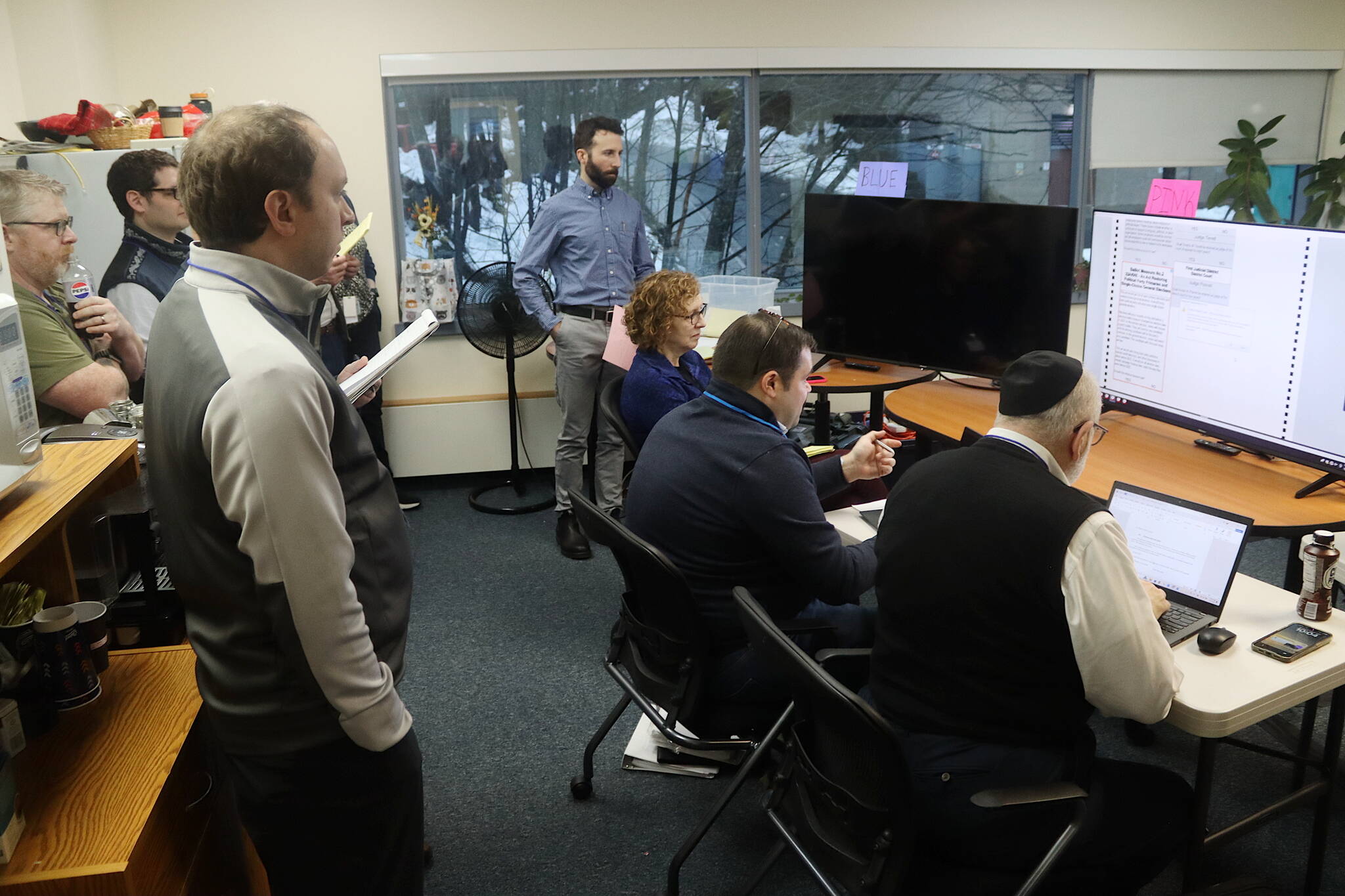This story has been updated with additional information.
A recount for a narrowly defeated ballot measure to repeal ranked choice voting in Alaska is underway under the watchful eyes of attorneys and other challengers, and the process expected to continue for up to 10 days, state Division of Elections Director Carol Beecher said Wednesday.
About 45,000 of more than 340,000 ballots cast in the Nov. 5 general election had been scanned between the start of the recount Tuesday afternoon and 3 p.m. Wednesday afternoon, she said.
Ballots are being brought in boxloads from a ground-floor storage room to the director’s office on the fourth floor of the Court Plaza Building in downtown Juneau for scanning on six high-speed Dominion machines. Images of the scanned ballots are being displayed on two monitors in an adjacent room where observers involved in the challenge can officially question a ballot, with elections division attorneys determining if the vote is valid.
“It’s not open to a person off the street,” Beecher said. “You have to be part of the group that has an interest in it. So we have the attorneys that are part of a party, we have the representatives and of course if a legislator wants to have one of their aides or something those are the interested parties, essentially, as per the statute.”
The initiative known as Ballot Measure 2 that sought to repeal open primaries as well as ranked choice voting, both of which were used for the first time in 2022 after voters approved the methodology in 2020, was defeated by 737 votes out of 320,985 cast (meaning roughly 20,000 voters left that question blank) , a margin of 49.89% to 50.11%. Republican Lt. Gov. Nancy Dahlstrom announced early last week an intention to recount the votes after the Alaska Republican Party stated it would challenge the results certified Nov. 30.
In addition to representatives of parties officially favoring or opposing the measure, members of the media are also being allowed to observe the counting scheduled from 8 a.m. to 8 p.m. daily. Observing is being limited to 10-minute periods at a time due to the number of people interested, Beecher said.
“It was quite full of attorneys yesterday,” she added.
Ballots from Alaska’s 40 legislative districts are being recounted in ascending order, so the first ballots are from Southeast Alaska’s districts one through four, which was still ongoing as of Wednesday, Beecher said. Officials have 10 days to complete the recount and she said the process is expected to be completed by that deadline.
A scan Wednesday morning of early, absentee, questioned ballots from Southeast Alaska being viewed one at a time on a monitor by about 10 challengers and election officials squeezed into the observation room resulted in most ballots passing through without comment after a few seconds on the screen.
But a steady, if irregularly paced, number of ballots with various odd markings on (or next to) one or both of the yes/no ovals voters were supposed to fill in completely prompted an exclamation of “pause,” usually simultaneously by several people in the room. The oddities ranged from slash marks through ovals to large Xs being drawn through the entire ballot wording for some or all items.
At that point Beecher would declare what the ballot appeared to be — a yes or no vote, an undervote where no valid choice was made or an overvote that was invalid because both options were marked. If observers disagreed with her assessment they would say they were formally challenging it.
Such a challenge was issued by Scott Kendall, an attorney for the group No On 2, with a ballot where both ovals were filled and a line was drawn through the word “NO” and the voter had written the word “NO” next to the line.
Beecher said “I would rule that as a ‘yes’” based on the line drawn through the word “NO.” The ballot was thus quarantined until attorneys with the elections division determine its validity.
Only one ballot was quarantined Tuesday and a few more during the first hour of Wednesday’s voting, a pace that likely wouldn’t result in enough to equal the 737-vote margin — which still wouldn’t overturn the results unless all were “no” ballots that were declared invalid.
Kendall, on Wednesday afternoon, said the pace of the process indicates the recount will indeed be done within the 10-day limit and it doesn’t appear the measure’s fate will change.
“Generally what we’re discovering is the machines are quite accurate,” he said. “When there are things the machines can’t read it’s basically spreading evenly.”
An official for the state Republican party observing the recount declined to comment Wednesday.
History suggests the odds of a recount succeeding are extremely low. Nationwide there were 36 statewide recounts in 6,929 general elections between 2000 and 2023 — with the outcome changing only three times, according to the nonpartisan research group FairVote.
“All three reversals occurred when the initial margin was less than 0.06% of all votes cast,” the group noted, adding the most recent reversal was in 2008.
An audit ordered by then-Lt. Gov. Kevin Meyer in 2020 when a measure implementing ranked choice voting was approved found 24 votes out of 361,400 cast where the results were different than the machine count.
The state Republican Party has hired a law firm led by Harmeet K. Dhillon for the recount effort. Her firm was also hired this year by the Arizona Republican Party to oversee an “election integrity program” due to extensive legal challenges by the party and its candidates after the 2020 and 2022 elections, as well as similar efforts in other states.
• Contact Mark Sabbatini at mark.sabbatini@juneauempire.com or (907) 957-2306.

